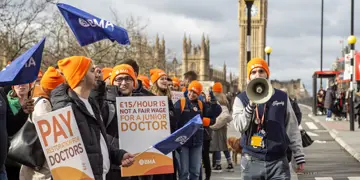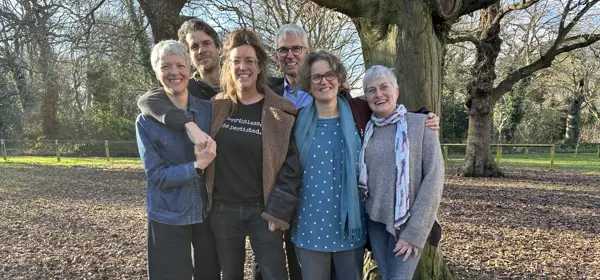Junior doctors endorse pay deal
Junior doctors endorse pay deal
Pay offer will see doctors awarded an on average 22.3 per cent pay uplift for the years 2023/24 and 2024/25
Junior doctors in England have voted to accept the Government’s offer on restoring pay, following an almost two-year-long dispute and 44 days of strike action.
A month-long referendum, in which thousands of votes were cast, resulted in 66 per cent of members voting to accept an offer on pay which will see doctors awarded an on average 22.3 per cent pay uplift for the years 2023/24 and 2024/25.
The decision to reach a deal means that industrial action among junior doctors in England has now ended, almost 24 months on from the start of the association’s dispute with the Government in October 2022.
Under the terms of the now agreed deal junior doctors, who from 18 September will be formally known and referred to as resident doctors, will receive an average uplift in pay worth 22.3 per cent in relation to the period since the start of the dispute over pay.
This total is made up of an additional average 4.05 per cent for the pay year 2023/24 on top of the previously awarded average 8.8 per cent, taking last year’s pay uplift to an average of 13.2 per cent – backdated to April 2023.
The remainder of the uplift comes from the recommended pay award for 2024/25 announced in July, which gave junior doctors an average eight per cent increase across grades.
Outside of pay, the deal will also promote a raft of measures designed to improve working conditions for resident doctors.
These include a commitment from the Government to work with the BMA to reforming the current system of training and rotational placements and efforts to streamline processes around exception reporting.
Pay restoration
Following a meeting to discuss the outcome of the referendum with their committee colleagues on 16 September, BMA junior doctors committee co-chairs Robert Laurenson and Vivek Trivedi thanked thousands of doctors for their unwavering courage and determination over so many months of industrial action.
They said that with doctors pay still 20.8 per cent behind in real terms what it was in 2008, the fight to secure full pay restoration for resident doctors remained an ongoing struggle
They added however that the newly agreed deal with the Government demonstrated the progress that had been made and which could now be built upon in order to secure further success in the future.
They said: ‘It should never have taken so long to get here, but we have shown what can be accomplished with our determination and with a government willing to simply sit down and talk realistically about a path to pay restoration. One strike was one strike too many.
‘This deal marks the end of 15 years of pay erosion with the beginning of two years of modest above inflation pay rises. There is still a long way to go, with doctors remaining 20.8 per cent in real terms behind where we were in 2008.
‘Mr Streeting has acknowledged our pay has fallen behind and has talked about a journey to pay restoration. He believes the independent pay review body is the right vehicle for this, and if he is right then no doctor need strike over pay in future. However, in the event the pay review body disappoints, he needs to be prepared for the consequences.
‘The resident doctors committee, as we will be called, will be using the next months to prepare to build on their success so that future cohorts of doctors never again need to see the kind of pay cuts we have.
‘We thank all doctors who have seen us through to this point by standing on picket lines and fighting for their worth. The campaign is not over, but we, and they, can be proud of how far we have come.’
The referendum over whether to accept or reject the offer on pay was held online from 19 August to 15 September.
The pay uplift and backpay will be paid in November.
- Until September 2024, resident doctors were referred to as ‘junior doctors’ by the BMA. Articles written prior to this date reflect the terminology then in use




